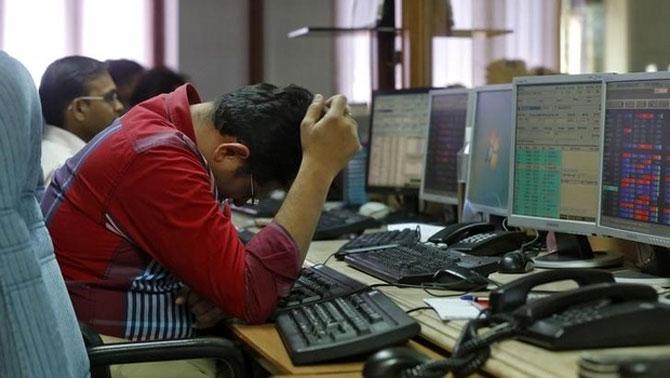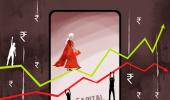'India's fundamentals are a lot better (than those of other emerging market economies).'
'India will suffer (witness a fall in its stock market) what I call the second order effect.'
'And the second order will happen when funds (belonging to macro and hedge fund investors and which have leveraged Japanese yen-carry trades), because they lose money elsewhere as lot of their positions were financed by borrowing Japanese yen, will have to book profits in investment destinations where they are making money, including in markets like India.'
'They (these investors) will have to effectively sell in countries like India and which is the consequence (the crash in equity markets) that Indian markets might see.'

As global equity markets witness a huge selloff that began August 1 -- the global benchmark Dow Jones Industrial Average has cracked almost 6 per cent in the last three days, the Indian benchmark Sensex fell by 4.1 per cent; the Japanese Nikkei saw the most ferocious fall August 5 when it plunged more than 12 per cent -- Hemant Mishr, co-founder and CIO of S CUBE Capital, a Singapore-based fund management company, in this two-part interview with Prasanna D Zore/Rediff.com discusses the reasons behind the carnage in the markets, why India still offers itself as a bright spot and explains why investors should stay on the sidelines for a week or two.
"There are concerns that the US might tip into a significant economic contraction or a recession. Our view is that's not correct," says Mishr. "It's too early to make that judgment. This is just a slowing of the economy and not a significant deceleration of the economy."
Could you explain to us what's happening in the global market and in that context, what is happening in the Indian markets? Why is the Indian equity market cracking?
Recently, global markets have seen two major changes. The first is Japanese interest rates going higher. That's happening for the second time in the past 17 odd years, which has led to a significant strength in the Japanese currency, the Japanese yen (Since July 10, 2024, the Japanese yen which was trading at 162 to one US dollar has strengthened and is currently trading at 142-143 to one US dollar, a steep 12 per cent fall in the value of the US dollar in relation to the Japanese yen).
So you have had a situation where significant correction has happened to a position that people had assumed (that the Japanese yen would keep weakening against the US dollar) will continue because that's how things had happened for 17-odd years.
Now, when interest rates in Japan were low (close to almost zero per cent, that is between zero and 0.10 per cent) for a long period of time and the currency was weakening, everybody used to borrow in Japanese yen terms and invest in high yielding currencies (the US dollar) or high yielding assets (say, equities in dollar terms). Now, that is what is called as a yen-carry trade.
So all the significant investments that have happened in high risk trades, whether it's equities or crypto assets or digital assets or private equity or venture assets, have been funded using a cheaper currency, the Japanese yen. That has changed in the past two weeks because of the rate hike (the Japanese central bank has started increasing interest rates) and the significant strength (in the Japanese yen against major trading currencies).
A lot of these trades are now required to be canceled because of the substantial opposite moment (the Japanese yen carry trades would make more profits if the Japanese yen kept weakening against the US dollar but the profits would keep decreasing if the Japanese yen started strengthening against the US dollar, which is what has been happening since July 10, 2024) and that is happening on both interest rates and the currency.
Now, there are two types of investors -- macro investors and hedge funds -- which normally invest using Japanese yen. And they also have leveraged investments and leveraged exposure, which typically means a high risk-high reward payoff.
Now, what has happened to their positions is because they are leveraged, their value-at-risk or stop loss limits are very narrow. When the opposite moment happens, they immediately have to go and sell.
These macro and the hedge fund investors who unfortunately had to sell (soon after the Japanese interest rates were hiked from around 0 to 0.1 per cent to around 0.25 per cent and expectations have begun to increase that there could be more such interest hikes by the Japanese central bank), and substantially so.
This has led to this vicious cycle of more of dollar selling and yen buying happening, which in turn is leading to more problem for these investors. This factor is Japan related.
The second factor that happened over the past two odd weeks, but also last week when important data came out, is the US economy seemingly is decelerating or slowing at a significantly higher pace than what everybody thought (the non-farm US payrolls came in at just 114,000 instead of the expected 185,000 and market participants and economic agents believe that the US Federal Reserve is too late in cutting interest rates leading to an economic downturn). There are concerns that the US might tip into a significant economic contraction or a recession.
Our view is that's not correct. It's too early to make that judgment. This is just a slowing of the economy and not a significant deceleration of the economy.
These two factors are the main cause of markets cracking right now.
How does this impact India now?
Unfortunately, global investors look at emerging markets as one category of investment and it is seen as high risk spectrum. To the extent that high risk trades (like the yen-carry trades) will get unwound, emerging markets will get hit.
India will be in a brighter position just because India's fundamentals are a lot better (than those of other emerging market economies).
Even from a sentiment point of view, sentiment for India continues to be positive on the back of the JP Morgan (GBI EM Global Series) bond inclusion and the 40-odd billion (US) dollars that will come in (inclusion of Indian government bonds into the GBI EM Global Series will only increase the demand for Indian debt among foreign investors).
India will suffer (witness a fall in its stock market) what I call the second order effect. And the second order will happen when these funds (belonging to macro and hedge fund investors and which have leveraged Japanese yen-carry trades), because they lose money elsewhere as lot of their positions were financed by borrowing Japanese yen, will have to book profits in investment destinations where they are making money, including in markets like India.
They (these investors) will have to effectively sell in countries like India and which is the consequence (the crash in equity markets) that Indian markets might see.
How much impact could this unwinding of Japanese yen-carry trade have on India?
What kind of correction do you expect if these investors, traders, hedge fund managers start unwinding their profitable trades in India to make up for the losses that they are making elsewhere?
A couple of things are important.
The first is whether you see the central banks coming in and comforting the market. Now you've seen a very sharp reaction in Asian markets (Japan's benchmark Nikkei index plunged more than 12 per cent in a single trading day on August 5 logging its worst trading day since the Black Monday crash of 1987).
The European markets too cracked by more than two per cent.
We will have to see how New York reacts to it (the interview was conducted at 4.45 pm on Monday, India time; the Dow Jones Industrial Average, the benchmark on the New York Stock Exchange was trading two per cent lower at 38,950 level at 10.15 pm IST; the broader S&P 500 too was trading 2.25 per cent lower and the technology-heavy NASDAQ was down 2.5 per cent).
It (how much the markets fall further from here) all depends on whether the central banks give adequate comfort (start reducing interest rates after the ongoing tightening to cool off inflation).
If they step in and offer the Federal Reserve's put -- earlier it was called Alan Greenspan's put -- wherein they effectively come in and backstop the market, saying, 'Don't worry, we'll provide liquidity to stabilise the market.'
If they do that, the damage will be contained for the time being.
There is this concept called Federal Reserve put, which means the central bank comes in and effectively gives comfort to investors that they will do whatever is necessary to stabilise the market.
Originally it used to be Greenspan's put, when Alan Greenspan was the Federal Reserve governor. Now the governor is Jerome Powell and if the Powell put comes in, I think market will get comforted. Otherwise, this could feed on to itself and have negative consequences.
It's (how much more the global equities will slump) also a function of the exact amount of Japanese yen-carry trade positions in the market. As of end of March 2024, that trade was around $2 trillion; our understanding is it's currently $2.3 trillion.
Interestingly, nobody knows how many of these trades are leveraged and unleveraged. But the leveraged trades will have to be cancelled (squared off). They will have to be liquidated. It's difficult to quantify the full impact that unwinding of yen-carry trades will have on the markets.
Leverage trades allow you to put one million dollar of equity, and on back of this equity you can borrow $5 million and invest the total wherever you think you can get highly rewarding trades. But then your stop loss levels are very tight.
Since the Japanese yen-carry trades have been blamed for the current bout of market rout, could you explain to our readers in a simple way, what exactly are yen-carry trades?
Thanks for asking that, because very often we assume that everybody understands financial jargon.
An Indian investor will borrow in rupee terms and invest in rupee terms in Indian equities. But when global investors allocate money, what they want to do is maximise returns. So, they typically borrow in the cheapest currency wherever in the world it is available, and then invests these moneys in the most attractive investment destinations.
As I mentioned in the beginning, for the past 17-odd years, interest rates in Japan have been very low. The Japanese yen is a globally convertible currency, just like the US dollar, or the UK Sterling.
If I am a US investor, I can actually borrow in yen in cheaper terms and then go and invest in a market that are priced in Indian rupee, for instance, say I invest in G-Secs (the bonds guaranteed by the Indian government) which gives 7 per cent return.
So if the yen doesn't move, I'm still getting 7 per cent return every year and that is a carry trade.
Now, a leveraged carry trade is when I borrow a million dollars that I'm investing then out of this amount I'm just putting $200,000 of my own money and the rest $800,000 I am borrowing.
This now becomes a four-time leveraged carry trade currency, which is much more complex than a simple carry trade currency. That is how carry trade in currencies work.
- Part 2 of the interview: 'Don't Panic! India Is An Oasis Of Calm!'











 © 2025
© 2025